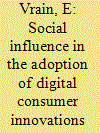|
|
|
Sort Order |
|
|
|
Items / Page
|
|
|
|
|
|
|
| Srl | Item |
| 1 |
ID:
128372


|
|
|
|
|
| Publication |
2014.
|
| Summary/Abstract |
This study employs a multiple-case study method, identifies barriers to the adoption of low carbon production, and categorizes these barriers into four domains: structural, regulatory, cultural, and contextual. The two most frequently mentioned barriers were "lack of financial incentives to stimulate low carbon innovation" and "lack of a common definition of low carbon production". The two least frequently mentioned barriers were "silos exist between planning and production" and "operational staff are often physically separated from planning staff, which isolates them from planning decisions". Furthermore, contextual barriers were significantly related to structural and regulatory barriers, while regulatory barriers were significantly related to structural barriers. Larger firms tend to have a more structured organization and lower perceptions of the employment term barrier. However, larger structured organizations have been affected by a long history of a planning-oriented economy and hence tend to have inflexible hierarchical systems. In contrast, small firms have hierarchical systems with less effect on low carbon production than those of large enterprises. Another interesting trend is the direct size effect on cultural barriers, which is evident in a culture of risk aversion, as well as the lack of low carbon technology and the existence of silos between planning and production.
|
|
|
|
|
|
|
|
|
|
|
|
|
|
|
|
| 2 |
ID:
101429


|
|
|
|
|
| Publication |
2010.
|
| Summary/Abstract |
Low carbon development (LCD) is a much used word in development circles today. As such, governments are actively exploring how to achieve their growth targets through a low carbon trajectory or even through a 'carbon neutral' pathway. This is a new area that challenges how development has been done so far, calling for not only a serious rethink of old practices but also contesting entrenched value systems. In this viewpoint, we explore some of the underlying issues that are driving the process of mainstreaming climate change in development. Recognising that there are variations in LCD, we map out the diversity of understandings and interpretations with a view to lay out the range of possibilities that countries can consider. We argue that whilst countries should certainly draw lessons from the experiences of others on mainstreaming climate change in their policies and practices, the version of LCD that each country follows needs to emerge from within its own national reality, anchored in its development prospects, aspirations and capacities.
|
|
|
|
|
|
|
|
|
|
|
|
|
|
|
|
| 3 |
ID:
149913


|
|
|
|
|
| Summary/Abstract |
National-level policies to promote deployment of low-carbon technologies have been suggested and used as a means to reduce greenhouse gas emissions in the context of international climate change mitigation. The long-term benefits of such policies in the context of international climate change mitigation depend on their effects on near-term emissions abatement and resultant long-term technological change that will reduce abatement costs of achieving global mitigation goals. There is also an argument that these policies might foster early-mover advantages in international low-carbon technology markets. We first review the factors that could influence such benefits and use a global integrated assessment model to present an illustrative example to understand the potential magnitude of these benefits. We find that reductions in long-term abatement costs might not provide sufficient incentives to justify policies to promote the deployment of low-carbon technologies, in particular, the emerging, higher-risk, and currently expensive alternatives. We also find that early-mover advantages can potentially provide substantial benefits, but only if these advantages are both strong and persistent. Our results suggest a role for international cooperation in low-carbon technology deployment to address the existence of free-riding opportunities in the context of global climate change mitigation.
|
|
|
|
|
|
|
|
|
|
|
|
|
|
|
|
| 4 |
ID:
183569


|
|
|
|
|
| Summary/Abstract |
Digital consumer innovations offer low-carbon alternatives to mainstream consumption practices. We contribute new insights on the importance of social influence in the uptake of digital consumer innovations for climate change across mobility, food, homes, and energy domains.
|
|
|
|
|
|
|
|
|
|
|
|
|
|
|
|
|
|
|
|
|